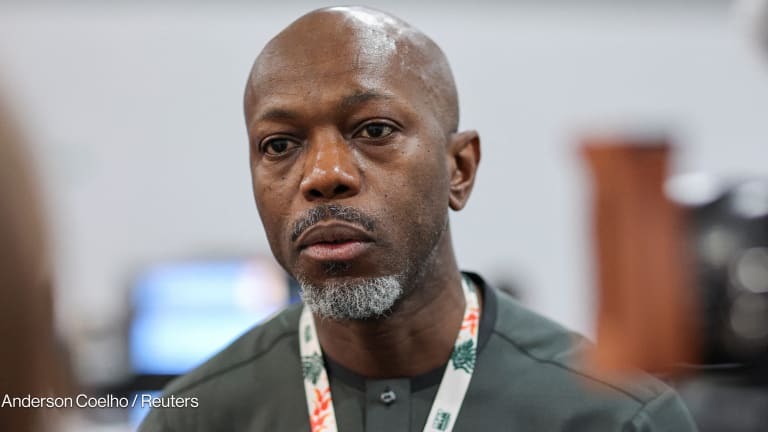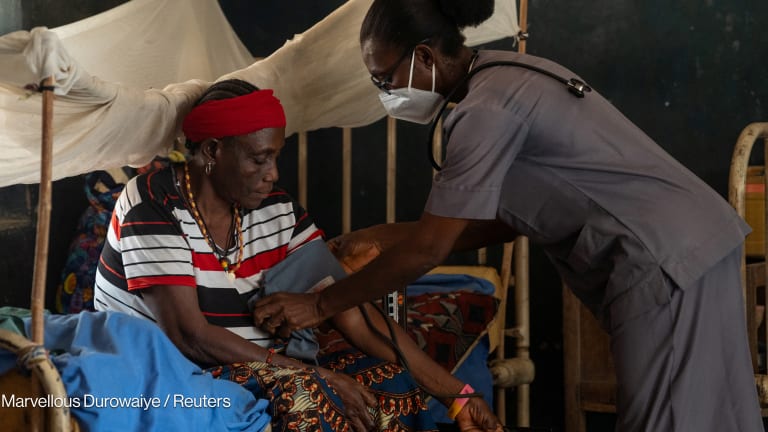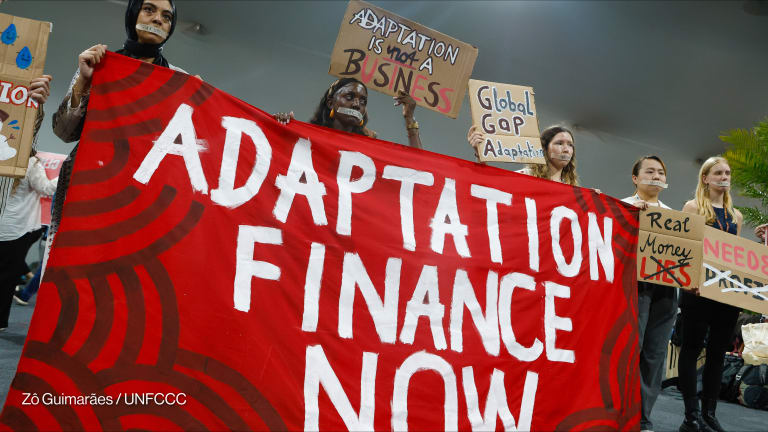A look at UNDP's private sector strategy
UNDP is adapting its approach to engaging and working with the private sector. The agency has a new strategy and an administrator who believes engagement with businesses of all sizes has to be part of its future.
ISTANBUL — The United Nations Development Programme is adapting its approach to engaging and working with the private sector — and it is in the process of finalizing and implementing a new strategy to guide that work. The new policy reflects a changing development landscape and a growing role for the private sector and public policy to work together in achieving the 2030 Agenda for Sustainable Development, UNDP Administrator Achim Steiner told Devex in an interview. “We live in an age where increasingly the way that public policy and the private sector can interact will determine whether we can actually make these transitions, these quantum leaps,” he said. “The realization that public policy and the private sector need to act in at least cohesion if not unison clearly is more and more visible.” The new strategy is based on the idea the Sustainable Development Goals will become the main global framework for businesses, investors, and governments. The strategy aims to help countries influence businesses and investors, embed the SDGs into their decision making and establish policy and regulatory environments that will align the private sector with the 2030 agenda. UNDP defines the private sector broadly — from publicly traded multinationals to small farmers who produce and sell much of the world’s food — in the policy. “The private sector strategy puts on paper a shift in mentality, metrics, language [that] have to be adjusted.” --— Dmitry Mariyasin, UNDP resident representative in Armenia “The fact of the matter is that we need trillions of dollars of private capital invested in the capacity of the economy to produce jobs, clean electricity, and many other things, but in a way that is aligned with larger objectives that have been articulated in one way through the SDGs,” Steiner said. To that end UNDP’s private sector strategy lays out a vision for collaboration with the private sector and also seeks to make changes within the organization to allow it to work differently — through a new Finance Sector Hub, changes in how it manages human resources to improve the sharing of best practices, and new innovation units at the country level. Why the shift? Governments are asking UNDP to help them understand the policy or regulatory environments and technologies that can help them both achieve the SDGs and navigate the new digital economy, Steiner said. More collaboration and a shift of attitudes about the role of the private sector is possible in part because companies are recognizing that smart regulatory frameworks are helpful given the changes and uncertainties that businesses face, Steiner said. “We are, particularly from a UNDP perspective, trying to address this issue of private sector in development less from a kind of who owns the assets but rather how can you align each other's assets to a common objective,” he said, adding that he believes UNDP is uniquely situated to help countries, in part by drawing on its network and best practices from around the world. Part of the case to businesses is that the SDGs can serve as a risk map, a barometer of what’s going right and wrong in the world, Steiner said. If the 17 SDGs are achieved, business will be dealing with a more predictable and stable world and finance will be cheaper, he said. Not every CEO or business owner will be part of this new direction and be working toward the Paris Agreement on climate change or the SDGs, Steiner noted. But the numbers are growing and he is intrigued by how much the private sector has started working with the SDGs across different geographies and sectors. “I think we are seeing a strategic moment of opportunity,” he said. “Here we are in a very disruptive moment and I think it is probably sometimes down to individual CEOs in the private sector who have both the vision, the clarity of thinking, and the personal commitment to be part of the change rather than abdicating responsibility.” While Steiner believes working more with the private sector, whether directly or by improving policy environments, is an important part of the future of development, he acknowledges challenges, including that corporate desires do not always align with what’s best for a country, or with UNDP’s goals. “Governments often turn to us when they face precisely these difficulties, whether it is negotiating with mining companies or fossil fuel companies, whether it is on the power sector and how they should go about it,” he said. “The issue is not whether UNDP likes a particular setting, it is how can we help government to push as far as possible its next development choice in the right direction.” UNDP is looking to define the SDG finance problem not as a funding problem or a funding gap, but as a systemic issue of realigning or redirecting how money is spent and invested, said Marcos Neto, the director of the new UNDP Finance Sector Hub. “The current financial system works, but it works for what it is defined to do, it doesn’t work for the SDGs,” Neto said, adding that what is needed is to shift finance. In order to create this change, investors need to put the SDGs in their strategies, companies need to align their business models with the goals, and governments should provide different enabling environments, he said. How things at UNDP are changing UNDP is making a number of operational changes to help execute the new private sector policy, including launching the Finance Sector Hub, expanding its climate-related work, and launching internal country level accelerator labs. The idea for the hub came through the process of developing its private sector strategy. UNDP discovered that at the national level, offices were experimenting with many tools in financing the SDGs — from cyber currencies to green bonds, to impact investing funds and helping governments design national budget systems that leave no one behind, Steiner said. The Finance Sector Hub, which will work on public and private finance, will seek to identify some of the great programs or ideas at UNDP that may be small, lack scale or be disjointed. It will try to learn from the best practices, create standardization, and help countries access tools, models, manuals, and people that can help them work more effectively, Neto said. The hub sits between the Bureau of Policy and Programme Support and the Bureau of External Relations and Advocacy, a unique arrangement that reflects a debate over the years about who owns private sector work. Both bureaus are contributing staff and the hub is working with teams across the globe, and with other bureaus as well, Neto said. The hub will help the agency learn what’s working and will curate best practices and look to help expand them and adapt them for other countries, he said. The vast majority of its work will likely be the “elevation of pockets of excellence that already exist,” Neto said. The hub is still figuring out exactly what areas it will focus on, but the goal is to help country offices find solutions that work in their contexts and address some of the major bottlenecks, which will include, in some cases, launching new global initiatives. Part of that effort is SDG Impact, which launched last year after six months of conversations with the finance industry, which told UNDP that what’s at issue in scaling SDG investments is not the financial engineering, but how to determine impact, Steiner said. “If you don’t have impact intelligence, you cannot monitor the impact, then you know making a market grow on that value proposition will not happen,” he said. SDG Impact is working to try to define the impact investing market in a number of ways. It is creating SDG impact standards that can be translated into a certification for investors and businesses. The initiative will also work to address the deal flow challenge through in-depth market reports outlining investment opportunities, by using its convening power, and through creating initiatives that build investment pipelines. A change at UNDP also took inspiration from work being done at the country level. UNDP will be launching 60 accelerator labs — small teams within country offices set up to draw on the “latest thinking on innovation, entrepreneurship, and some of the tools with which we can help governments more quickly address the design questions they face right now,” Steiner said. The idea for those labs grew in part from the example of Armenia, where the country office started an experimentation lab to tackle challenges in new ways. Armenia has some of the highest cancer rates in the region but few people get screened due to a lack of awareness and some cultural challenges, said Dmitry Mariyasin, UNDP’s resident representative in Armenia. So the lab is running a behavioral experiment to try to boost cancer screenings in collaboration with the government, with the goal of informing “evidence-based policymaking and making them think cross-sectorally,” he said. The idea is that the lab can make small investments and test programs or interventions that the government can then take up or use in its policies, Mariyasin said. Eventually, the goal is for the lab to grow and be sustainable and independent, he added. “I’m optimistic. The private sector strategy puts on paper a shift in mentality, metrics, language [that] have to be adjusted,” he said. Steiner said the introduction of these 60 labs is “a corporate investment in the sense of making UNDP more agile and think differently about its role to support governments, but it's also about what I believe the future of development will be like which is you don't invent solutions in government anymore,” he said. “They are simultaneously being co-created in a very dynamic space, an economic space, a political space, a social space, and we need to be able to, as an institution, but also by helping governments, manage that economy of innovation.” UNDP is also looking to scale its climate work. Today, it is the largest provider of climate change project services in the U.N., providing billions of dollars’ worth of work across hundreds of projects, Steiner said. “We're in the midst of also looking at how we can reconfigure our support to countries on climate change both in terms of the portfolio we run but also much more strategically because the climate change challenge will not be met by individual projects,” he said. “There is a systemic transition our economies need towards low-carbon economies that we need to connect to the SDG agenda.” Editor’s note: UNDP facilitated Devex's travel for this reporting. However, Devex maintains full editorial control of the content.
ISTANBUL — The United Nations Development Programme is adapting its approach to engaging and working with the private sector — and it is in the process of finalizing and implementing a new strategy to guide that work.
The new policy reflects a changing development landscape and a growing role for the private sector and public policy to work together in achieving the 2030 Agenda for Sustainable Development, UNDP Administrator Achim Steiner told Devex in an interview.
“We live in an age where increasingly the way that public policy and the private sector can interact will determine whether we can actually make these transitions, these quantum leaps,” he said. “The realization that public policy and the private sector need to act in at least cohesion if not unison clearly is more and more visible.”
This story is forDevex Promembers
Unlock this story now with a 15-day free trial of Devex Pro.
With a Devex Pro subscription you'll get access to deeper analysis and exclusive insights from our reporters and analysts.
Start my free trialRequest a group subscription Printing articles to share with others is a breach of our terms and conditions and copyright policy. Please use the sharing options on the left side of the article. Devex Pro members may share up to 10 articles per month using the Pro share tool ( ).
Adva Saldinger is a Senior Reporter at Devex where she covers development finance, as well as U.S. foreign aid policy. Adva explores the role the private sector and private capital play in development and authors the weekly Devex Invested newsletter bringing the latest news on the role of business and finance in addressing global challenges. A journalist with more than 10 years of experience, she has worked at several newspapers in the U.S. and lived in both Ghana and South Africa.








